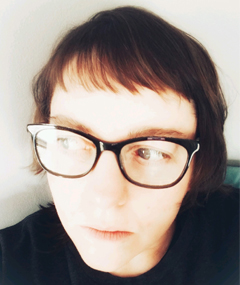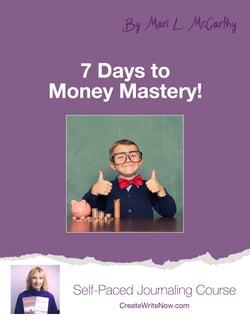I started journaling at seven years old. My Sunday school teacher placed in my hands a black comb-bound book with a pinky-purple cardstock cover adorned with a little girl writing in a book, she looked like a Precious Moments figurine. My teacher’s instructions: use the journal every night and write just for me. I filled those grainy photocopied pages in a week.
The next Sunday when I asked for another, she warned me to not be greedy. My face and ears burned as she handed me my second journal. I possessed an extensive vocabulary for a seven-year-old but wasn’t good at saying what I needed. However, I could express myself on the pages of my journal. Without fail, as I finished one, another journal full of empty pages appeared in my hands. Now I have Rubbermaid tubs stuffed with journals in my basement, and I only bought a handful.
I met my father around the time I received that first journal. My parents split when I was three. He was a Green Beret living with his third family, and recently settled about an hour and a half away. Our meeting wasn’t what I dreamed or hoped it would be. We never gelled. I wasn’t Daddy’s Little Girl whom he twirled in the air. We never had little jokes. In the thirty-five years until he passed away, we never had a comfortable conversation. His relationship with the brothers I lived with and the many half-siblings I didn’t was a different story. I felt unseen when I was in front of him and unremembered when I was not. I turned to my journal to manage the noise, anxiety, and fear I dragged around with me. My journal allowed me say what I needed and wanted. Over time, it helped me figure out how to take care of myself. It taught me independence.
On top of my struggles to voice my needs out loud, I’m also dyslexic. In school, teachers thought they were encouraging me by saying, “I’ve never met someone so smart and yet so stupid and careless.” My classmates, however, didn’t pick on me for my mistakes or join in with the teachers. I couldn’t voice what I needed very well, but I was good at speaking up for others. Being able to speak in class and know the answers weren't difficult for me, but I struggled with homework and tests. Teachers said I was lazy, but I studied more hours than anyone else I knew. Night after night, I agonized over my work and memorized everything. I was a decent student, but fell short of the teacher’s expectations.
I was sent for testing my third year of college. The man I spent hours failing tests in front of told me I had the largest frustration zone he’d ever seen. He said my ideas, thoughts, and brain processes were high, but my ability to communicate them was low. Tears caught in his strawberry blond eyelashes as he asked me how I made it past middle school with that much frustration. I told him I survived by journaling. The blank page doesn’t judge me. It isn’t worried about my spelling or grammar mistakes. It doesn’t tell me I’m stupid or lazy. He told me he was proud of me for making it so far as a creative writing and literature major. Journaling gave me peace inside that frustration zone and fostered my love of writing.
A few years after college, I was living with my boyfriend David. We’d met at summer camp while in high school. He asked me to marry him even though I told him I never would. I decided to take the chance and said yes. I’m not sure how many journals I filled sorting out how to allow the kindest, sweetest man I’d ever met to love me. There were few healthy relationships in my life to observe for guidance. My journals allowed me to reflect on what I wanted from a marriage, then to share that with David. We used those conversations to build the foundation of our marriage of seventeen years (so far). Journaling gave me the freedom to love and be loved the way I deserved.
Unfortunately, I became ill after college. That lasted about fifteen years. It sapped my energy and leftover nothing for creative writing. I still kept a journal, because it didn’t ask me for anything. A few words here and there were enough. My world over those years became small. I worked and went to doctor’s appointments. When people spoke to me, they wanted sensational details and stories, but the truth about a long-term illness is that it’s boring. You’re bored of it and yourself. You want to hear all the details about someone else’s day, like how they stole Janet’s yogurt from the work fridge. As the sick person, you don’t want to relive the story how twenty-seven needle stick attempts at finding a vein, or how the marks on your arms got you mistaken for a junkie. Or that time the salesman who saw bruises on your thighs, which you got from brushing against your desk, asked if you were safe to go home with your husband. These were well-intended offers of help, but not what I needed. The journal let me cry and be bored with myself. My journal held tell the details I was desperate to expunge, like how a needle digging in my arm in search of a shriveled used up vein felt as if it was scraping bone.
At one point I almost died. I spent five days in the hosptial. The nurses took such good care of me. They brought me little extras, like tiny bottles of shampoo smuggled from home, stickers of smiley faces for the side of my bed to focus on while I was in pain, and most importantly paper and pen. I didn’t think I was going to make it, so I wrote notes to my husband. Most were written in a semi-lucid space between doses of morphine. They were filled with things for him to do, when bills needed to be paid, and how glad I was I married him. It was my hospital journaling. I threw them out the morning I was discharged. Journaling is for letting go. I never look at the journals in my basement, and probably never will. They were tools for me to let go when I needed it.
A couple years ago, I had the surgery that ended my illness. As my six week medical leave came to a close, I bought the prettiest journal I’ve ever owned. I knew I wanted to write. All I wrote for six months in the hard cover book that looked like a gold flecked watercolor painting was: I am a writer. For two months that journal went to a Saturday morning memoir writing class with me and I filled it. More journals started showing up in my hands again. I progressed to an e-journal called Journey. I can access it from both my laptop and phone. When I write by hand in public people always talk to me curious about what I’m doing. No one looks twice when I’m on my phone. Plus, with Journey I can add photos and videos.
My latest journaling iteration is my blog christyflutterby.com, which I started last summer. It’s about being over forty and a newbie writer. Surviving to my forty feels weird enough but starting a new goal like writing is huge. For me, blogging is merely a focused form of journaling. To start something like that after years of a illness-constricted world was scary, but now I wish I’d started it sooner. It's not a “how to be a writer” blog, but I share experiences about writers’ retreats and residencies, and mention writers I’m meeting, books I’m reading, and what I’m learning. I also share bits about my writing process, which I’m still figuring out. Blogging has helped bring me back into the big beautiful world that I missed for so long.
Journaling helped me find my voice inside of noise, fear, and anxiety. Writing for myself gave me independence and peace inside of frustration. My journals fueled my love of writing, gave me the freedom to love and be loved. Allowed me to say the things I couldn’t and taught me to let go. Journaling is the trail I’ve left behind, and the path back to the world I feared I lost.

Author bio: Christy O’Callaghan lives in Upstate, New York. She teaches job skills to incarcerated adults and helps them seek employment upon release. Her favorite pastimes include hiking, gardening, swimming, snowshoeing, and collecting sea glass—anything in the fresh air. You can learn more about her, her blog about being an over 40 newbie writer, and her writing at christyflutterby.com. You can also follow her on Instagram @christyflutterby and Facebook at Christy O’Callaghan.
NOW ON SALE!



Leave Comment